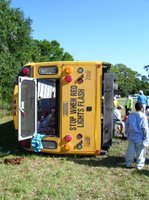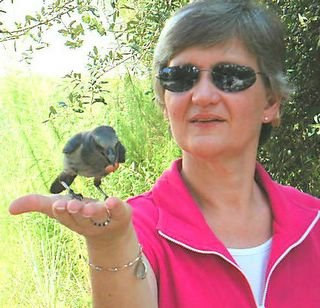
Last month’s topic at my CI support group was emergency medical issues and cochlear implants. We discussed medical identification jewelry, the training (or lack of) that's given to local hospital ER personnel concerning how to deal with hearing impaired patients, and other issues related to safety. So when a notice was posted on our community bulletin board, “Volunteers needed to act as victims in a county-wide disaster simulation exercise”, Gerry and I signed up. Here’s my chance, I thought, to witness firsthand how a deaf person is treated during a large-scale emergency medical crisis.
The scenario was a terrorist-incited explosion which resulted in an accident involving a bus and an ambulance. A group of us with all manner of realistic mock injuries were stationed inside the bus. Gerry was "assigned" a broken femur bone (left leg) and I was to be mentally altered, confused and disoriented but otherwise unharmed. I wore my medical ID necklace over my torn and stained T-shirt.
With a healthy mixture of excitement and trepidation, I pocketed my BTE as soon as the sound of sirens signaled their eminent approach. Obviously, my world went silent and the experiment commenced. About 4 hours later, after being triaged to a yellow tarp in the field, transported to a local hospital, and processed for treatment, the drill was over. I eagerly re-connected my BTE to my internal implant and, voila, the glorious sounds of the real world were suddenly mine again!
What did I learn from this unusual experience? For what it’s worth, here are my observations:
1. The policemen and firefighters were not interested in reading my medical ID. Perhaps they ignored my frantic cries of “I’ve lost my implant. I can’t hear!” and my waving my medical ID pendant for their inspection because they knew me to be “out-of-it”.
2. The assumption made by all rescue personnel assigned to me, both in the field and at the hospital, was that I knew sign language. It was even recorded on one of my hospital forms. Do they not know that most late-deafened adults grew up in the hearing world and never learned sign language? ASL is only useful if the other party also “speaks the same language”!
3. No one thought to write down the questions they were asking me or to point to the questions on the form. Apparently being deaf means that you are also illiterate!
4. I felt very vulnerable and totally dependent on my powers of observation, acutely aware of the reality of the fact that this simulated exercise would have been my real world experience if not for the miracle of CI technology. Thank God for my bionic ear!
5. Being functional deaf is as exhausting as I remembered it to be. When we arrived home, I took two aspirins and headed for the couch.
Wednesday, May 03, 2006
A Disaster Simulation
Subscribe to:
Post Comments (Atom)

2 comments:
Ms. Adams;
I read with great interest your blog on the disaster exercise. I am the County Emergency Manager in Casper WY. We have a program, which is a national program, called CERT. Community Emergency Response Team. This program has nine weeks of instruction and hands on training of how to prepare for disasters and what to do after the disaster hits. That training includes; Disater medical, disaster fire fighting, light search and rescue, disaster psychology, terrorism etc.
A couple of years ago, we obtained a grant for preparedness. One of the projects we wanted to do was get a warning system to the community who is deaf. We obtained some alpha-numeric pagers and altered them. We then invented a cradle to put them in to sit on a desk or table next to the bed. Plugged into the cradle was a strobe light and a pillow vibrator. These work pretty good. Now that we have those we contemplated how to get them out to the community. We met with the "Deaf Club" and offerred them the receivers as well as offerred a CERT class just to their club. Nothing like this has been done before and the members of the club jumped at it. We hired a couple of interpretors and had about 17 in the class. It was one of the most fulfilling and learning experiences or our (the instructors') lives. Not only did the students learn but all of the instructors as well. We also go to know a part of our community that we had not known before. Our next CERT class consisted of a mix between both folks who are deaf and well as those who could hear. It, again worked great. We now have several folks who are deaf who participate in our drills as victims as well as rescuers. They have also been on several emergency call outs that have occurred. By the way, I use the word deaf as that is what they told us they prefer to be called. They also made it clear, and I quote, "We are deaf...but we are not dumb!"
This class and interaction has heightened all of our awareness of folks with speacial needs out there that need the same treatment, service, etc as any person.
I was glad that one of our CERT folks, who happens to be deaf, sent us the blog you put out. I only hope that your community learns from this exercise as we have learned from our folks who happen to be deaf. Thank you for sharing.
Lt. Stewart Anderson, Natrona County Emergency Management 307-235-9205
I just found your blog through HEARING JOURNEY. I am so glad that I did because I am experiencing everything you wrote about in "A Disaster Situation". I admire your mother for at the age of 82 I know exactly how she feels. I live alone so it's doubly hard for me.
I am, at long last, going to get a Cochlear Implant next month and am doing research on what it will be like. Thank you for your information; it is most helpful.
Darlene (darcostner@yahoo.com)
Post a Comment